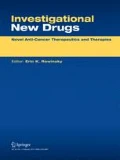Summary
Purpose Ipilimumab is a T-cell-potentiating monoclonal antibody directed against cytotoxic T-lymphocyte antigen-4 (CTLA-4) to promote antitumoural immunity. In phase III trials, ipilimumab was shown to be the first agent to improve survival in advanced melanoma patients, regardless of previous treatment. We report a case of severe neurologic disease after ipilimumab treatment. Patient and methods Neurologic symptoms including facial diplegia, tetraplegia, areflexia progressed with time a few days after the fourth monthly ipilimumab infusion. Analysis of the cerebro-spinal fluid showed elevated proteinorachy and lymphocytic meningitis. Despite high doses of steroids and symptomatic treatment, the symptoms worsened. Results Veinoglobulins were then infused and the patient began to improve and recovered almost normal activity two years later. Conclusion The adverse event profile associated with ipilimumab was primarily immune-related. This is the first case in which such a severe event has been reported.

References
Hodi FS, O’Day SJ, McDermott DF et al (2010) Improved survival with ipilimumab in patients with metastatic melanoma. N Engl J Med 19(363):711–723
Robert C, Thomas L, Bondarenko I et al (2011) Ipilimumab plus dacarbazine for previously untreated metastatic melanoma. N Engl J Med 30(364):2517–2526
Wolchok JD, Neyns B, Linette G et al (2010) Ipilimumab monotherapy in patients with pretreated advanced melanoma: a randomised, double-blind, multicentre, phase 2, dose-ranging study. Lancet Oncol 11:155–164
Bouchra A, Benbouazza K, Hajjaj-Hassouni N (2009) Guillain-Barre in a patient with ankylosing spondylitis secondary to ulcerative colitis on infliximab therapy. Clin Rheumatol 28(Suppl 1):S53–S55
Turatti M, Tamburin S, Idone D et al (2010) Guillain-Barré syndrome after short-course efalizumab treatment. J Neurol 257:1404–1405
Shin IS, Baer AN, Kwon HJ et al (2006) Guillain-Barré and Miller Fisher syndromes occurring with tumour necrosis factor alpha antagonist therapy. Arthritis Rheum 54:1429–1434
Feinstein TM, Gibson MK, Argiris A (2009) Cetuximab-induced aseptic meningitis. Ann Oncol 20:1609–1610
Nagovskiy N, Agarwal M, Allerton J (2010) Cetuximab-induced aseptic meningitis. J Thorac Oncol 5:751
Kashyap AS, Kashyap S (2002) Infliximab-induced aseptic meningitis. Lancet 6(359):1252
Tarhini AA, Iqbal F (2010) CTLA-4 blockade: therapeutic potential in cancer treatments. Onco Targets Ther 24(3):15–25
Eckert A, Schoeffler A, Dalle S et al (2009) Anti-CTLA4 monoclonal antibody induced sarcoidosis in a metastatic melanoma patient. Dermatology 218:69–70
Hunter G, Voll C, Robinson CA (2009) Autoimmune inflammatory myopathy after treatment with ipilimumab. Can J Neurol Sci 36:518–520
Yang JC, Hughes M, Kammula U et al (2007) Ipilimumab (anti-CTLA4 antibody) causes regression of metastatic renal cell cancer associated with enteritis and hypophysitis. J Immunother 30:825–830
Small EJ (2007) A pilot trial of CTLA-4 blockade with human anti-CTLA-4 in patients with hormone-refractory prostate cancer. Clin Cancer Res 13:1810–1815
Bettelli E, Oukka M, Kuchroo VK (2007) T(H)-17 cells in the circle of immunity and autoimmunity. Nat Immunol 8(4):345–350
Von Euw E, Chodon T, Attar N et al (2009) CTLA4 blockade increases Th17 cells in patients with metastatic melanoma. J Transl Med 7:35
Callahan MK, Yang A, Tandon S et al. (Jun 9, 2011) Evaluation of serum IL-17 levels during ipilimumab therapy: Correlation with colitis. ASCO MEETING ABSTRACTS 2505
Conflict of interest
Caroline Robert declares consulting activities for Bristol-Myers Squibb.
The other authors declare that they have no conflict of interest.x
Author information
Authors and Affiliations
Corresponding author
Rights and permissions
About this article
Cite this article
Bompaire, F., Mateus, C., Taillia, H. et al. Severe meningo-radiculo-nevritis associated with ipilimumab. Invest New Drugs 30, 2407–2410 (2012). https://doi.org/10.1007/s10637-011-9787-1
Received:
Accepted:
Published:
Issue Date:
DOI: https://doi.org/10.1007/s10637-011-9787-1

